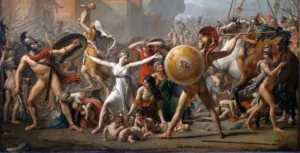In 2017, there are three anniversaries that are of particular interest to me as a Christian and as a Christian who supports Israel. First, 2017 marks the 500th anniversary of the Protestant Reformation led by Martin Luther. There is not a nation on earth that has not been impacted in some way by the Reformation. Whether it’s the impact of Christian missionary activity on nations like India where Protestant missionaries led the fight against widow burning or the impact of treaties like Westphalia which ended the Catholic verses Protestant wars of religion in Europe, Luther’s actions still reverberate globally.
While Martin Luther’s courage and conviction is noteworthy, unfortunately his view of the Jews is a stain on his reputation. His early criticism of the Roman Catholic Church’s antagonism towards the Jews eventually gave way to a ferocious anti-Semitism of his own. In his work “On the Jews and Their Lies” (yes, that’s the title), Luther describes what he considered appropriate behavior toward the Jewish people:
- Burning down Jewish synagogues and schools and warning people against them
- Refusing to let them own houses
- Taking away their prayer books and Talmuds
- Prohibiting their Rabbis from teaching
- Revocation of protection for Jews on the highways
- Prohibition usury and removal of their gold and silver from them
- Requiring the Jews to earn their food through hard labor
Antagonism towards the Jews by Martin Luther was even used as a justification for the Holocaust by the Nazis. In recent years numerous synods of the Lutheran Church have denounced the anti-Semitism of Martin Luther, but unfortunately in some circles it is finding revival.
This brings me to the second notable anniversary, the Balfour Declaration. In 1917, 400 years after the Reformation marking, in part, 400 years of Protestant Christian anti-Semitism, British Foreign Secretary Arthur James Balfour declared;
His Majesty’s government view with favour the establishment in Palestine of a national home for the Jewish people, and will use their best endeavours to facilitate the achievement of this object, it being clearly understood that nothing shall be done which may prejudice the civil and religious rights of existing non-Jewish communities in Palestine, or the rights and political status enjoyed by Jews in any other country.
It is debated the degree to which Lord Balfour’s personal theology concerning the restoration of Israel played into this declaration. Some have argued that this is simply a political move to garner political support from Jews in the UK and the US. Regardless, the declaration serves as a break with longstanding norms. First, the declaration breaks with Christian anti-Semitism modelled by Martin Luther and others. The growing influence of what would become known as Christian Zionism was a major factor in moving the Christian Church away from anti-Semitism. Second, it breaks with colonialism. In the case of the Jews and a few years later the Arabs too, the Balfour Declaration marks the beginning of the end of colonialism as the British government begins advocating for the self-determination of peoples.
The benefits to the whole of humanity that have resulted from the reestablishment of Israel are immeasurable. Unfortunately, there are those, particularly in the UK, who are determined to use this anniversary as an opportunity to assail Israel and even apologize to the Arabs for helping establish modern Israel.
In spite of the declaration’s commitment to limit the impact on non-Jewish communities and to establish much larger Arab states, many Arabs refused to recognize the national homeland for the Jewish people. Israel was attacked in the halls of the League of Nations, the United Nations, and finally on the ground. The war between Israel and its neighbors in 1948 ended with a cease-fire and the establishment of the infamous “green line.” The line left the Old City of Jerusalem under Jordanian occupation, and Jews were denied access to the Old City, including the most sacred site to the Jewish people—the Western Wall.
Fifty years ago, in a short and perhaps miraculous war Israel once again defeated its neighbors. The Jordanian army was pushed across the Jordan River; the Egyptian army was pushed out of the Sinai Peninsula; and the Syrian army was pushed out of the Golan Heights. The 1967 Six-Day War, as it has come to be known, is another anniversary that will be commemorated this year. For Palestinian Arabs, the war marks the beginning of the military occupation of the West Bank. For some Jews, it marks the liberation of Judea and Samaria. For the three major religions that call Abraham father, the liberation of the Old City of Jerusalem should be seen as a model for religious liberty. When the Old City of Jerusalem was under Jordanian control, Jews were not allowed in the city to pray. After the war in 1967, not only were Jews allowed to pray, but Muslims and Christians were too. While the Jordanian army destroyed the Grand Synagogue in the Jewish Quarter, the Jewish army did not retaliate in kind. Instead, the mosque next to the Grand Synagogue was preserved.
Fifty years later, millions of tourists walk through a gate once blocked by sand bags and barbed wire. They walk through the narrow streets where Jews, Christians, and Muslims sell souvenirs, falafel, and fresh pomegranate juice. They touch the rose marble upon which Jesus’ body was laid. They fit prayers into the cracks between the stones of the Western Wall. They marvel at the blue tiles and gold dome on the Temple Mount. Many of these tourists are mildly aware of the tension, but at the same time are enjoying the blessings brought by Israel’s commitment to religious liberty.
In the Providence of God, every event in history is meaningful to His redemptive plan for humanity. With that in mind, it is my hope in 2017 that as these anniversaries are commemorated, we will celebrate the blessings that have come from these significant events and yet also be mindful of the pain that has been caused by these events too.
—
Luke Moon is the Deputy Director of the Philos Project. Prior to that, Luke served as business manager for the Institute on Religion and Democracy, and, before that, as a missionary with Youth with a Mission for 12 years. Luke has lived, worked, and taught in over 45 countries, and has advocated on a number of human rights issues along the way. He holds a BA in Biblical Studies from the University of the Nations and an MA in Global Politics from Regent University. Luke is also an ordained Southern Baptist minister.
Photo Credit: Western Wall with Israeli flag in Jerusalem. November 2016. By Joanna Penn, via Flickr.






 Live in the DC area? Sign-up for Providence's in-person events list!
Live in the DC area? Sign-up for Providence's in-person events list!